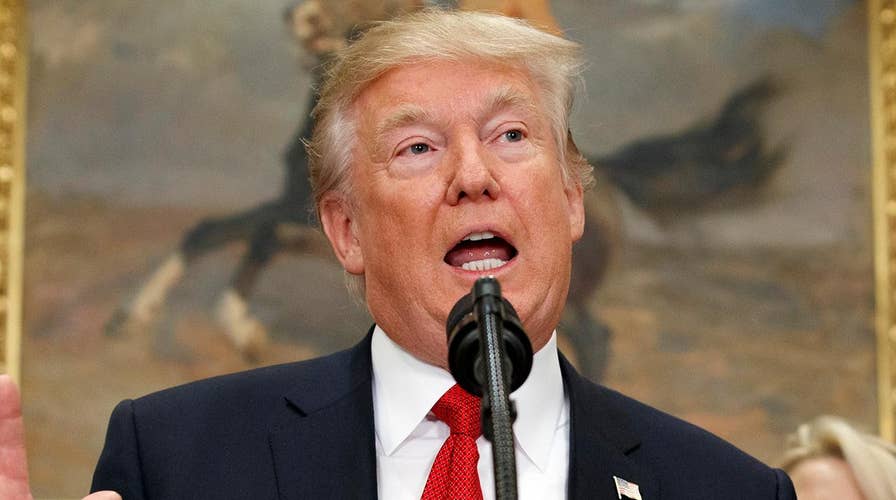Trump: Today is only the start of ending ObamaCare nightmare
President Trump signs executive order on health care which he says will allow millions and millions of people to sign up for 'great health care.'
Stymied by lack of action by Congress, President Trump has taken two important and beneficial actions on health care. Critics say he is undermining health care for millions of Americans. But in reality, he is putting pressure on Congress to change ObamaCare before it collapses and does serious damage to our health care system.
President Trump first issued an executive order Thursday that increases competition among health care insurers and makes it much easier for people to join associations and escape the prohibitively expensive individual insurance market. This will leave many consumers better off and put pressure on Congress to finally change ObamaCare to a more patient-centered, price-centered marketplace.
Next, the president announced he is ending what a federal court has ruled are unconstitutional subsidies being paid to Big Insurance to lower the deductibles and co-pays of policies for 6 million low-income Americans who buy coverage on ObamaCare exchanges.
Democrats are reacting as if President Trump is throwing people out of wheelchairs and hospital beds. Let’s take a deep breath and report what’s really happening.
The president has not ended the premium-support subsidies that flow to people who buy health insurance under ObamaCare. Those subsidies were properly appropriated by Congress when it created ObamaCare.
Instead, President Trump is ending a different type of subsidy that flows to insurance companies. What’s critically important to understand is that Congress has never provided an annual appropriation for these subsidies – either when Democrats or Republicans ran the ObamaCare program.
But despite the lack of congressional action to approve spending on the insurance company subsidies, the Obama administration sent billions of dollars every year in these subsidies to the companies with no legal basis for doing so.
Critics call President Trump’s action lawless. John Baackes, CEO of LA Care Health Plan in Los Angeles, told Politico that the president is guilty of a “gross dereliction of duty.” He claimed that “the Affordable Care Act is still the law of the land and the cost-reduction subsidies are part of that.” But that’s just not so.
Last year a federal court ruled that President Obama’s action to award subsidies without congressional approval “violates the Constitution.” The court concluded: “Congress is the only source for such an appropriation, and no public money can be spent without one.” That ruling is now on appeal to a higher federal court, but is unlikely to be overturned.
The bottom line here is that if Congress wants to subsidize unprofitable insurance that provides less value for consumers than pre-ObamaCare policies it has to do so directly by voting to spend money on such subsidies.
Congress “cannot punt to the president’s pen and phone,” notes South Texas College of Law professor Josh Blackman.
Leaving aside the legality of the cost-sharing subsidies to Big Insurance, the subsidies also clearly aren’t working. Under ObamaCare we have seen huge increases in both premiums and deductibles for insurance policies.
Normally in a marketplace, premiums increase only as out-of-pocket costs and deductibles decrease. Not with ObamaCare, whose very design makes plans more attractive to less healthy pools of enrollees. That’s exactly what ObamaCare was designed to prevent – but isn’t succeeding.
Hadley Heath Manning of the Independent Women’s Forum says we all should focus on solving the problems of ObamaCare by pressuring Congress to pass real long-term fixes to its problems, not point political fingers.
“The best practical solution would be to remove some of the other regulations in ObamaCare that are actually responsible for high coverage costs,” Manning told me. “If lower income people were free to buy more basic plans, this would reduce insurance costs without the need for government subsidies. Competition would keep prices low.”
Let’s view President Trump’s executive orders as a kick in the rear of Congress to finally act on health care, and in a way that benefits consumers more than insurance companies.
If Congress still fails to act, I have a further suggestion that President Trump has already hinted at implementing. In July he suggested he could end Congress’ special treatment under ObamaCare with the stroke of a pen.
President Obama conspired with Congress to allow its members and staff to buy insurance under ObamaCare though the District of Columbia’s small-business exchange, where they received the same employer subsidies they had gotten before the Affordable Care Act.
In 2014, a federal judge concluded the “executive branch has rewritten a key provision of the Affordable Care Act so as to render it essentially meaningless in order to save members of Congress and their staffs.” But the judge then concluded that those fighting to overturn the exemption for Congress lacked standing to sue because they hadn’t been personally injured by it.
President Trump can follow up on his cancellation of the bailout to Big Insurance by telling members of Congress his next step will be to zero out their exemption, an action which would throw both members and staff on the individual ObamaCare exchanges. Now that would finally put a fire under Congress for real action.

